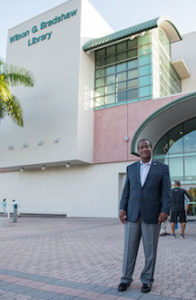 The library at Florida Gulf Coast University in Fort Myers now bears the name of Wilson G. Bradshaw. Dr. Bradshaw served as the university’s president from 2007 to 2017. During his decade in office, enrollment increased by 60 percent to nearly 15,000 and the number of degrees granted annually doubled.
The library at Florida Gulf Coast University in Fort Myers now bears the name of Wilson G. Bradshaw. Dr. Bradshaw served as the university’s president from 2007 to 2017. During his decade in office, enrollment increased by 60 percent to nearly 15,000 and the number of degrees granted annually doubled.
Before becoming the third president of Florida Gulf Coast University, Dr. Bradshaw served for seven years as president of Metropolitan State University in St. Paul, Minnesota. Earlier, he was provost and vice president of academic affairs at Bloomsburg University in Pennsylvania. He also served a dean of the graduate studies at Florida Atlantic University in Boca Raton.
A native of Sanford, Florida, Bradshaw earned bachelor’s and master’s degrees in psychology from Florida Atlantic University and a Ph.D. in psychobiology from the University of Pittsburgh.











